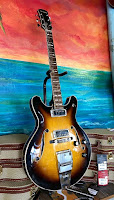 |
| Spencer Davis |
Spencer Davis passed away of a heart attack on October 19 of this year. He gained fame in 1966 as the leader of The Spencer Davis Group.
 |
| The Spencer Davis Group |
Spencer became acquainted with the band members and was asked to join the group. The band's name was changed to the Spencer Davis Group because Davis was the only member that did press interviews.
Davis began playing guitar at age 16. He was deeply influenced by American Blues musicians such as Leadbelly, and Big Bill Broonzy. He also listened to Buddy Holly's music The British players that Spencer Davis favoured included such musicians as Davey Graham, John Martyn, Alex Korner, and Long John Baldry.
 |
| The Spencer Davis Group |
Later releases included "Keep On Running", "Somebody Help Me" and “I’m A Man”.
Steve Winwood sang lead vocals on all the Spencer Davis Group's hit records up to "I'm a Man" in 1967.
The Spencer Davis Group continued after Steve Winwood left to form Traffic in April 1967. The group recorded two more albums before splitting in 1969.
A new version of the group with Spencer Davis and Pete York appeared in 1973 only to disband a year later in late 1974.
Different versions of the band toured in later years under Davis' direction. The group permanently disbanded and Davis moved to California.
 |
| It's Been So Long LP |
In 1971 Davis recorded an acoustic album with Peter Jameson called It's Been So Long. Spencer later recorded a solo album called Mousetrap. for United Artists. Due to poor sales he decided to move back to the UK, where he formed a new Spencer Davis Group.
 |
| Spencer Davis |
During the mid 1970's Davis also worked as an executive at Island Records where he was a promoter working with Bob Marley, Robert Palmer and Eddie and the Hot Rods as well as promoting the solo career of former Spencer Davis Group member Steve Winwood.
 |
| Classic Rock All Stars - Spencer Davis, Felix Cavaliere, Mitch Ryder, Rick Derringer |
In 1993, Davis formed the supergroup the Class Rock All-Stars. He left the group in 1995 to form World Classic Rockers with former Eagles bassist Randy Meisner, singer Bobby Kimball and guitarist Denny Laine.
 |
| Spencer Davis at Catalina Island Exhibit |
It was called "The British Invasion", where Davis was joined on a panel by, among others, Micky Dolenz of the Monkees and a July Fourth concert featuring Davis singing his hits with a backing band named 'The Catalina All Stars'.
Davis married his wife Pauline in the 1960s. They had two daughters: Sarah, Lisa, and a son, Gareth. The couple was divorced in the late 1970s. Davis died from pneumonia on 19 October 2020 at the age of 81.
The original version of The Spencer Davis Group included Spencer playing several unusual guitars for that era.
The first was a 1959 H49 Harmony Stratotone Jupiter. The guitar had a similar shape to a Gibson Les Paul, but it was actually a hollowbody instrument. The guitar included two DeArmond gold foil pickups on it's spruce top that were mounted on faux tortoise shell material.
The guitars top has naturally finished wood, but the back, sides and back of the neck were finished with a sunburst finish. He had another one with a sunburst finish.
 |
| 1959 Harmony Stratotone Jupiter |
 |
| 1959 Harmony Stratotone Jupiter |
 |
| Muff Winwood with Harmony H22 bass |
Perhaps it was because his band-mate, Muff Winwood was playing an equally inexpensive 1960 Harmony H22 Hi-Value hollow body bass that he purchased for 40 quid: around $99 USD at the time.
 |
| Harmony H22 Bass |
For much of The Spencer Davis Group's early career these guitars were used.
 |
| Spencer Davis with Yamaha SA-50 |
Later on Davis used a 1960's Yamaha SA-50 guitar. The body resembled a Gibson ES-335, but that was the only similarity. This was an early Yamaha hollow body instrument, with twin Yamaha humbuckers, and a built-in piezo pickup. The F-holes included shielding to minimize feedback. A Jazzmaster type vibrato tailpiece anchored the strings.
 |
| Late 1960's Yamaha SA-50 |
This guitar had a roller bridge. The "wings" of the cutaway had a sharp edge, that was smooth on Gibson type instruments. The set neck was topped with an ebony bound fretboard that had split trapezoid fret markers. The headstock had a unique shape.
Though it was not a Gibson or Epiphone, it was a unique instrument and a step up from the Harmony guitar.
 |
| Spencer Davis With His Different Guitars |
In the early days of the group Spencer Davis played 1967 Fender Villager Acoustic 12 string guitar, and a couple of Hofner guitars, including a Club 40 and Club 60.
In later years Davis played some more conventional instruments worthy of a professional musician including a Black Gibson Les Paul, a Sunburst Telecaster, and several Fender Stratocasters.
Click on the links below the pictures for sources. Click on the links in the text for further information.
©UniqueGuitar Publication 2020 (text only)










3 comments:
Great post man. Keep it up.
Check out this original song about first rains. Hope you all like it. Click below to watch it on Youtube.
Ghan Ghan - Vishal Khatri
When Jaoanese Beat Group"The Spiders"went to England,Hiroshi Kamayatsu(spiders Guitarist)presented this Yamaha to him.
I saw him perform with the Happy Together Tour playing Squier Stratocasters in 2016 or 17.
Post a Comment